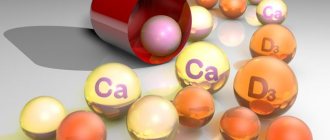Compatibility of vitamins and minerals with each other: how to avoid overdose and not cause harm
When buying capsules or tablets that combine several organic compounds at once, you take a risk because you cannot take into account their compatibility. In addition, there is a high risk of exceeding the permissible dose. We remind you: an overdose is just as dangerous as an insufficient energy supply.
Will there be any benefit from taking multivitamins, which are generously offered in pharmacies? We advise you to find a pair for each important substance in advance or check whether all the components of the complex you are buying are compatible with each other. And don’t forget that a healthy diet, balanced with all valuable elements, cannot be replaced by any supplements: come to the Slavic Clinic for recommendations on the right diet to get everything your body desperately needs from vegetables, fruits and other healthy and "profitable" products.
The human body is a kind of chemical factory. In order for it to work without ceasing, various components are needed: these are fats and carbohydrates, and minerals. But in order to ensure that nothing interferes with the full assimilation of the listed components, it is necessary to monitor compatibility, because some of them interfere with each other. There are also those that help to complete the task (energy replenishment of the body) in record time, and even those that cannot be used separately by us for their intended purpose.
How not to harm yourself when deciding from which sources to obtain valuable substances? It is necessary to carefully monitor the compatibility of vitamins and microelements. This is very important, since the combination of incompatible things is dangerous for health: the body will not receive help, but it will experience the negative effects of organic compounds to the fullest.
Products containing zinc
Try to refrain from drinking the invigorating drink in the first couple of hours after consuming foods containing zinc.
Caffeine contains tannins that form bonds with certain minerals in the diet.
The body cannot break down these connections, therefore, drinking a cup of coffee with a product containing zinc, the body will simply be left without the microelement.
Caffeine will remove zinc in urine that would otherwise be absorbed by the body.
In particular, we are talking about foods such as oysters, red meat, poultry, beans and nuts.
Why are we not benefiting?
Scientists have proven that nutrients interact with each other. This mutual influence does not always have a positive effect on our condition - some multiply the beneficial effect of others, and some prevent it from manifesting itself.
What about the beloved multivitamin complexes, which contain many completely different compounds? Our experts warn: we should be extremely careful when choosing, especially when we need to decide to replenish the deficiency of micro- and macroelements. Incorrect “mixing” can lead to adverse consequences. Come to our clinic to avoid the negative effects of organic compounds and learn how to combine them correctly.
We now know that:
- B6 is an excellent assistant in the absorption of magnesium.
- D works well together with calcium and fluorine - this compound improves their metabolism.
- Without vitamin C, chromium and iron will not be absorbed normally.
- Selenium is a trace element that can enhance the beneficial effects of tocopherol.
- Zinc and manganese are good partners. Together they protect cells from destruction.
- The benefits of taking iron increase significantly if this important component works together with copper.
The following vitamins combine well:
- A+ C and E;
- B6 + B3;
- B5 + B4, B9 and C;
- C+ A, E, B5 and B9.
These are examples that only confirm that some substances essential for our body cannot act alone - they need a partner in the fight for health and restoration of a weakened immune system. But there are also compounds that should not be taken together.
Calcium-containing products
If you can’t do without a cup of aromatic coffee in the morning, the first thing you should do is avoid eating foods containing calcium for breakfast.
You should forget about the combination: cream or milk in coffee. When these foods are consumed at the same time, calcium is not absorbed and gallstones may form over time.
In addition, caffeine leaches calcium, which can damage bones and joints. The daily calcium intake is 1000 mg, two or three cups of coffee will remove 2-3 mg from the body.
Therefore, coffee poses a serious danger only to people who drink this drink every hour.
By the way, decaffeinated coffee has no effect on the absorption of calcium and the formation of gallstones, even in combination with dairy products.
Incompatible vitamins and minerals
C+B12
It is believed that B12 ceases to be active when paired with ascorbic acid. Scientists have proven that taking these two components together makes it difficult to absorb cyanocobalamin - it simply blocks it.
B12+B1
If you have a skin rash from taking thiamine, and soon other signs of an allergy appear, vitamin B12 will only strengthen it. Thiamine itself is absolutely incompatible with calcium and magnesium - these minerals reduce the solubility of the beneficial organic compound in water.
B2+copper, zinc, iron
The combination of these substances can only have a sharply negative effect - in such a company, riboflavin cannot be fully absorbed.
B12+B6
Cyanocobalamin has a high cobalt content and destroys pyridoxine.
B9+zinc
The latter slows down the absorption of folic acid.
A+E
In high concentrations, vitamin E does not help retinol to be absorbed.
E+D
The result of combining tocopherol with calciferol is a slowdown in the consumption of the latter.
K+A, E
Vitamins A and E block the absorption of vitamin K, so these substances should not be taken together - only alone.
Here are a few more facts that everyone needs to know in order to be aware of which combinations can lead to negative consequences:
- Magnesium is not an aid to thiamine and tocopherol.
- The combination of zinc and folic acid helps to reduce the solubility of these compounds.
- If the level of magnesium in the body is steadily increasing, then you need to seriously think about replenishing the deficiency of calcium and phosphorus.
- Calcium, copper and iron interfere with the absorption of zinc.
Everything about the compatibility of vitamins, minerals and trace elements with each other can be found in the table. We pay special attention to the fact that health problems can be avoided if you combine nutrients correctly, eat healthy foods and take care of yourself. Be prudent and use separately those organic compounds that can be harmful in pairs.
How does the drink affect hemoglobin?
The main beauty of coffee, which determined its popularity, is that it gives the body energy. The redistribution of energy in the human body is caused by a special fermentation of coffee, through which the process of absorption of iron by the body slows down.
According to one study , mothers who regularly drank coffee had significantly lower iron concentrations in their breast milk compared to those who abstained from coffee. This contributed to a decrease in hemoglobin in newborns and increased the risk of developing anemia. It was concluded that coffee actually “flushes” iron from the body.
Meanwhile, iron deficiency in the body is one of the main causes of low hemoglobin levels. This is the stable relationship between coffee consumption and the level of hemoglobin in the blood - with coffee consumption it decreases .
Long-term iron deficiency aggravates the situation of those suffering from anemia - anemia (a condition corresponding to a low level of hemoglobin in the blood).
The development of this condition can lead to unwanted problems such as:
- deterioration of hair and nails;
- weak potency in men and menstrual irregularities in women;
- pale skin, swelling;
- deterioration of skin condition;
- fatigue accompanied by shortness of breath and fainting;
- anorexia.
Can I drink it if I have low hemoglobin? It should be noted that although a reduced hemoglobin level may not be associated with iron deficiency, nevertheless, coffee consumption, one way or another, aggravates the condition . So, given the mechanism of coffee’s effect on the body, it is better for people suffering from low hemoglobin levels in the blood to give it up.
At the same time, there are other mechanisms of coffee’s effect on the cardiovascular system and blood, some of which should be classified as positive, others - negative.
What do the specialists of the Slavic Clinic advise?
We recommend taking elements that interfere with the absorption of each other at different times of the day - for example, some during the day and some in the evening. This will help avoid negative influences and maintain the beneficial effect.
Some people believe that the more active ingredients a multivitamin contains, the healthier it is. However, this is just a misconception that is actively promoted to the masses by the media. The value of the complexes with which pharmacy shelves are replete is not in the amount of minerals and trace elements. Their healing properties can be fully manifested only if the body really needs to be nourished from the outside. So you can take such drugs only if there is a significant deficiency of one or another organic compound.
In other cases, the best option is to get everything we need to maintain vitality from the foods we eat. The main thing is not to forget about the right combinations.
Is it harmful or not to drink food?
Rarely does lunch, and sometimes even breakfast, go by without the usual glass of tea or compote. And how could it be otherwise, when since childhood we were usually given first course, second course and “something to wash it down”. Have you thought about the benefits of such proximity at the table and in the stomach?
To drink or not to drink?
Digestion is a complex multi-stage process of intake, digestion and absorption of nutritional components. The harmonious functioning of the gastrointestinal tract is based on a balanced ratio of nutrients, as well as the liquid that comes with them, and therefore you still need to drink something.
What is more dangerous: excess or deficiency?
The vitamins received by the body leave it naturally - excreted in the urine. It is much more difficult with microelements, which tend to accumulate. Their excessive intake can cause serious illnesses.
- Zinc – if poisoned, it can cause fever, stomach and intestinal disorders.
- Copper - a violation of copper metabolism - is the cause of genetic diseases, and its excess leads to intoxication of the body. Symptoms are nausea, indigestion, sudden headaches, liver damage.
- Fluoride - we all know that this microelement prevents the development of caries. However, exceeding the permissible norm leads to fatigue and lethargy, sudden weight loss, anemia, and brittle bones.
Residents of our country most often suffer from deficiency of iron, iodine, magnesium, and selenium. However, an excess of microelements is observed in only one out of six Russians. We are not only talking about toxic and dangerous substances - essential nutrients also accumulate in the body - iron, boron, chromium, cobalt.
Before you start taking multivitamins that contain microelements, find out whether it is necessary to replenish your body's reserves. To do this, it is not enough to read the article: come and see our specialists. We recommend visiting a nutritionist: he will create the right diet that will help you lose weight and get all the necessary nutrients at the same time. Don’t forget: they are all found in the foods we eat, and we just need to create the right menu so that our body doesn’t need anything.
What should you not take with your medications?
Medicines enter into various reactions with molecules in our body - this is what their action is based on. Unfortunately, if you take the medicine with something inappropriate, the nature of the reactions that occur can fundamentally change.
Alcoholic drinks
Action. Ethyl alcohol changes the permeability of cell membranes. Due to this, the effect of all drugs, except antibiotics, is enhanced - as well as their side effects. You should not hope that this method will help reduce the dosage of an expensive medicine: the load on the liver increases faster than the intended effect and very quickly reaches dangerous limits.
Beer (including non-alcoholic) contains substances that inhibit the functioning of liver enzymes. Because of this, medications are processed more slowly than the manufacturer intended, which also increases the risk of overdose.
Consequences. Nausea, vomiting, headache. There are side effects of the medicine taken together with alcohol. Possible liver failure and gastric bleeding.
Never mix alcohol and painkillers - this can lead to serious liver problems or stomach bleeding. It is strictly forbidden to combine antidepressants and alcohol : the negative consequences of unpredictable force will affect not only the liver, but also the brain.
Fruit juices
Action. Grapefruit juice is the most famous example of a drink that is best not taken with pills. It affects the functioning of the CYP3A4 enzyme. This substance is active in the cells of the liver and intestines. In the intestines, the enzyme helps the absorption of many drugs. The juice inhibits the functioning of CYP3A4, and due to this, the tablet works much less effectively than it should.
If you drink grapefruit juice along with medications, it will disrupt the processing of active substances in the liver. At first, this does not manifest itself in any way, and therefore the person continues to take medications as usual. Meanwhile, the concentration of active substances in the body increases, and overdose symptoms and side effects begin to appear.
Other fruits that can interfere with the enzyme are orange and pomelo, as well as noni and pomegranates.
Consequences. Ventricular tachycardia, muscle tissue destruction, renal failure, purpura (capillary hemorrhages).
Grapefruit juice itself is beneficial: there are studies showing that regular consumption of it reduces the formation of atherosclerotic plaques. Ironically, it should not be taken with cholesterol-lowering medications . Do not mix grapefruit juice with antidepressants, anticonvulsants, antihistamines, hormonal and many other drugs.
Milk
Action. Milk is healthy because it contains a lot of calcium, magnesium and iron ions. These same ions can bind to antibiotic molecules and reduce their availability to the body. Therefore, you should not take antibiotics with milk. The enzyme xanthine oxidase, found in milk, inhibits the effect of some anticancer drugs. But drinking painkillers and antipyretics with milk is even beneficial: the drink softens their negative effect on the gastric mucosa. Fat-soluble vitamins (A, D, E, K) also benefit from proximity to milk.
Consequences. Some medications do not work at their usual dosage. There will be no serious side effects from taking medications and milk together, unless, of course, milk is fundamentally contraindicated for a person (for example, due to lactose intolerance or allergies).
Milk is not only a source of healthy calcium, but also an enemy of antibiotics!
Tea
Action. Tea contains tannins - tannins. They form strong bonds with many ions, therefore the digestibility of a number of microelements is impaired. In particular, you do not need to take iron supplements with tea. Tea may slightly reduce CYP3A4 and some other liver enzymes, but to a much lesser extent than grapefruit juice. Interactions between tea components and medications often show little or no effect, and therefore have not been studied well enough.
Consequences. Some drugs are less easily absorbed if taken with tea. There are no serious side effects.
USE OUR SERVICE AND FIND OUT WHICH PRODUCTS CANNOT BE COMBINED WITH MEDICATIONS
Coffee
Action. Coffee has the same effects as tea and also contains caffeine. Obviously, this drink should not be taken with sleeping pills. But painkillers, on the contrary, work longer if you take them with coffee - and if you decide to do such experiments, then it is better to reduce your usual dose.
It is better to keep medications against arrhythmia and all drugs that regulate the functioning of the heart and blood vessels away from a cup of espresso, because caffeine increases blood pressure and increases heart rate. There is evidence that even a decaffeinated drink does not have the best effect on the functioning of liver enzymes, but this issue requires additional research. To be on the safe side, always find out if your doctor's prescribed medication can be combined with coffee.
Consequences. In most cases the same as for tea. If coffee is with milk, the effects of interaction between milk and drugs are added to them. Coffee itself can cause increased blood pressure, tachycardia, and insomnia; when coffee is combined with medications, these effects can be aggravated.
Oral hormonal contraceptives and caffeine are processed by the same enzymes. The body of women who take birth control slowly processes caffeine. Due to this, the effect of each cup of coffee lasts longer !
Author: Svetlana Yastrebova Published: December 14, 2021
Source of energy and strength in winter: how to protect yourself in the cold
Is it possible to do without special complexes if you prepare your diet correctly and take into account which vitamins are compatible with each other and which are not? Yes, but on one condition - if we strive to preserve valuable organic compounds and not destroy them.
When meeting with clients, our specialists often give a good example: almost every day we all buy exactly the food that seems most convenient to us to prepare. Most of the products that meet us on store shelves go through the stage of canning and additional processing. It is this that destroys active substances that are so beneficial for our body. And during storage, we constantly forget about vitamins, minerals and microelements - scientists have proven that already on the third day of keeping fruits containing ascorbic acid in the refrigerator, some of it is lost.
By the way, the amount of useful elements in greenhouse tomatoes, peppers and cucumbers directly depends on many factors: the composition and quality of the soil, fertilizers, and how the grown vegetables are watered. So, the calculation of the required daily dose obtained from food should be entrusted to specialists - it can be very difficult to determine it yourself.
The whole truth about vitamins: how to understand that it’s time to help your body
In autumn, many of us feel a loss of energy. It becomes difficult to wake up in the morning, and by the end of the working day you still feel tired and exhausted. The main cause of these unpleasant symptoms is hypovitaminosis - a lack of vitamins in the body, which leads to weakened immunity, exacerbation of chronic diseases and viral infections.
However, doctors warn: you should not immediately run to the pharmacy for the first vitamins you come across. You need to take vitamins carefully, following certain rules. Otherwise, instead of improving your well-being, you may end up with new health problems.
How to understand that it's time to start taking vitamins
There are many symptoms of hypovitaminosis. This includes pale skin, prone to dryness and irritation, and dull, split ends, and cracked corners of the lips that neither creams nor hygienic lipsticks can save. Lack of vitamins also leads to bleeding gums, provokes dizziness, tinnitus, red eyes, and leads to insomnia.
A weakened person often suffers from colds and experiences a constant feeling of fatigue and apathy. An acute lack of even one vitamin can lead to the development of serious diseases. For example, an absolute deficiency of vitamin C (vitamin C deficiency) leads to scurvy, a serious disease characterized by bleeding gums, joint and skin problems. Lack of vitamin B1 leads to disorders of the central and peripheral nervous system, disturbances in the functioning of the heart and other internal organs. A lack of vitamin D is dangerous for the development of osteomalacia, or rickets of adults, a disease of bone tissue, during which the skeleton can be deformed and nervous disorders can develop. Vitamin E deficiency is accompanied by disruption of the body's recovery processes.
At risk, doctors include people who lose weight through strict diets, those who like to snack on the run, and those who abuse coffee, soda, and fast food. Vegetarians are also under threat. Their diet is usually low in protein, which is necessary for the absorption of many vitamins.
People suffering from cardiovascular diseases, kidney problems and allergies also experience vitamin deficiencies.
A high risk of developing hypovitaminosis also exists in women who constantly take hormonal contraceptives, as well as in those who abuse alcohol and cigarettes.
How to understand which vitamins you need
It is best to take a blood test for vitamins. To do this, you need to see a therapist and get a referral to a laboratory. The result of the analysis will show the lack of certain vitamins and minerals in your body. The doctor will choose the method of their restoration. He will calculate the required daily intake depending on your gender, age and percentage of vitamin deficiency, and recommend the right combination of diet and pills. He will also determine the duration of the course of treatment.
Taking vitamins without consulting a doctor is fraught with the development of hypervitaminosis (excess of vitamins), allergic reactions (to preservatives and additional components) or general intoxication (poisoning) of the body, negative for the immune system and human health.
How many times a year should you take vitamins?
Multivitamin complexes are recommended to be taken one to three times a year. For the purpose of prevention, these drugs are prescribed in courses of one to two months. If tests show that the body does not have enough microelements, then it is necessary to select a vitamin complex with the appropriate minerals. They should be taken in the same way, in courses of one to two months, from one to three times a year.
During those periods of time when the body “rests” from multivitamins, doctors advise taking ascorbic acid in a dose of 50-75 mg per day.
How to take vitamins correctly
It is best to take vitamins in the morning after meals. Under no circumstances should you eat them on an empty stomach. If the vitamins are in capsules, then you can only take them with water; you cannot take them with milk, soda, juices or coffee. They can interfere with the absorption of nutrients. You should not take vitamins during a course of antibiotic treatment. You should treat them very carefully during treatment with any medications. You should definitely consult a doctor about the compatibility of these drugs.
You need to take vitamins in strict accordance with the instructions. They should be taken with particular caution by people with food allergies. If the package does not say “chewable,” then the tablet or capsule should be swallowed whole, without biting or chewing. Otherwise, some of the vitamins may be destroyed in the mouth and stomach.
Water-soluble vitamins do not accumulate in the body and must be taken with food. These include - H, C, B vitamins (B5, B2, B1, B12, B6) Fat-soluble vitamins (A, D, K, F and E) tend to accumulate in the body, therefore, you need to more carefully monitor their dosage .
Which vitamins are incompatible with each other?
Some vitamins are incompatible with each other. For example, B1 comes into conflict with B6, B12. You should not take it at the same time as calcium or magnesium: they contribute to its poor solubility in water. All these substances must be used separately or alternately.
Vitamins B2 and B5 in combination with iron and copper do not have a very good effect on the body. Vitamin B9 (folic acid) should not be taken with zinc. Vitamin B12 loses its abilities when combined with vitamins A, B, C, E, as well as iron and manganese. Vitamin C (ascorbic acid) is incompatible with vitamins B1, B12 and copper. As the amount of ascorbic acid increases, copper begins to disappear.
Vitamin E loses activity when interacting with vitamin D, magnesium, zinc and copper. And vitamin K does not combine with vitamins A and E, which prevent its penetration into cells.
What vitamins to take in the fall
The main vitamins of spring are: vitamin C, B6, vitamins A and E. Vitamin complexes containing zinc, selenium and additional components such as ginseng, lemongrass and echinacea are also effective.
Vitamin B6 is very important during the off-season. It is responsible for the functioning of both the cardiovascular and nervous systems of the body. The best assistant in the formation of immunity. Vitamin C – ascorbic acid. You can’t do without this vitamin in the fall. It improves the general condition of the body, plays an important role in metabolism, and improves immunity. Vitamin E – removes toxins from the body. Is indispensable in the autumn. Vitamin A is needed to maintain good condition of teeth, nails and hair. In addition, it strengthens the immune system, protects against various colds, respiratory tract infections, flu, plays an important role in normalizing metabolism and slows down the aging process.
...Of course, you need to help your body. And the modern selection of vitamins is simply huge. All you have to do is choose the ones that suit you best.
"New Business"
What affects the intake of vitamins and minerals
The results can worsen:
- Some drinks - coffee, strong tea. Milk can also have a negative effect. Try to either reduce the amount of these foods or consume them separately from energy supplements (after 4-6 hours) - if you take a multivitamin.
- Poor intestinal microflora is another factor that affects nutrient absorption. To restore microflora, it is necessary to increase the proportion of plant foods in the diet - this is what beneficial bacteria like.
- Antibiotics – taking them will not cause harm if you take probiotics at the same time.
Eliminate stress, help your intestines by improving its microflora, remember that there are incompatible vitamins, and eat right. By following our recommendations, you will receive the necessary substances from food in full. The specialists of the Slavic Clinic will not only give useful advice, but will also offer an individual weight loss program with the right diet for every day, and will help you determine what your body needs. Change with pleasure - without restrictions and prohibitions. Get back your slimness and health - start a new life with us.
Recommendations for drinking coffee and caffeinated drinks
- Drink coffee or tea between meals.
- Wait at least an hour after eating before drinking coffee or tea.
- Increase your heme iron intake through meat, poultry, or seafood.
- Increase your vitamin C intake with meals.
- Eat foods fortified with iron.
- Eat foods high in calcium and fiber, such as whole grains, separately from foods rich in iron.
This will help limit the effect of coffee and caffeinated drinks on iron absorption.
We started drinking more coffee: what does this mean?
For the first time in recent years, coffee consumption in Russia exceeded tea consumption. Kommersant Style finds out which statements about coffee are myths, and which ones are still worth paying attention to.
Staying at home during quarantine has not been in vain - cheering yourself up with a cup of coffee throughout the day has become more of a norm than usual. Back in May, all major news channels shared an unprecedented fact - for the first time, Russia began to consume more coffee than tea. And this despite the fact that our culture of coffee consumption has developed as primarily not a home drink, but rather a social drink - something that we drink either at business meetings, or take away from coffee shops in paper cups. Let's look at the basic beliefs about this drink, is everything so clear?
Coffee reduces the effectiveness of vitamins
This is one of the most common points that adherents of a healthy lifestyle like to discuss. For example, there is a common belief that if you drink a glass of orange juice followed by an Americano, this makes it impossible to absorb vitamin C. “Caffeine (in the amount of more than three cups of coffee per day) actually interferes with the action of vitamins B, PP, C, and reduces the content in the body iron, potassium, zinc, calcium, selenium,” says Konstantin Karuzin, sports doctor, neurosurgeon, author of the personal health system Bioniq Health-Tech Solutions and the Telegram channel @hackyou_biohacking. “For example, B vitamins contain nitrogen, and tannins from coffee react with them and neutralize the effect of beneficial substances of vitamins. And one cup of 150-200 ml inhibits the absorption of calcium, and in general, caffeine washes calcium out of the body, and as a result of excessive coffee consumption, bones become fragile. If you do drink a cup of coffee, then it is better to postpone taking micronutrients for an hour or an hour and a half.”
Coffee is addictive
Many people have probably already tested this statement on themselves - and indeed, in the first time after stopping coffee, there is a withdrawal syndrome, a kind of caffeine “hangover”. Melanie Waxman, SHA Dietitian, Nutritionist, Natural Therapies and Wellness Coach, says, “Caffeine addiction is a proven fact and has been officially included in ICD-10, the International Statistical Classification of Diseases and Related Health Problems. Caffeine addiction can cause symptoms such as headaches, fatigue, difficulty concentrating, anxiety and depression. Consuming caffeine stimulates the adrenal glands to produce more cortisol, also known as the “stress hormone.” Thus, by drinking coffee, we force the body to digest a product that increases stress levels, as well as causing fatigue and hormonal imbalance.”
Photo: Getty Images
Coffee strains the nervous system
Yes, caffeine is a psychostimulant, it activates the central nervous system, enhances cardiac activity, increases mental and physical performance, reduces the feeling of fatigue and the need for sleep. But in general, everything is not so simple, or rather, not everything is the same for everyone. “The effect of caffeine depends on the type of nervous activity,” says Konstantin Karuzin. “For some people, caffeine in large doses enhances inhibition processes. Daily consumption of caffeine in moderation and in the absence of medical contraindications is safe. And in some cases it is even beneficial, since caffeine can reduce the risk of developing certain diseases (metabolic syndrome, liver disease, Alzheimer's disease). However, some people experience symptoms such as irritability, insomnia, headaches and irregular heart rhythms when consuming caffeine. Why is this happening? The liver, which contains special cytochrome proteins, is responsible for the metabolism of caffeine in our body. The lower their activity, the longer caffeine has its stimulating effect. About 95% of caffeine in the body is metabolized by cytochrome CYP1A2. Genetic variants in the CYP1A2 gene can alter the activity of cytochrome, causing caffeine to have a longer-lasting effect on the body and lead to unwanted effects.
If after drinking a cup of coffee you feel a rapid heartbeat, anxiety, tremors, nausea, or increased blood pressure, then most likely you are a carrier of this gene, and in this case, taking caffeine can harm the body. But the case of carriage of this gene accounts for only 5–10% of the total number.
To identify polymorphism of cytochrome CYP1A2 for caffeine detoxification, you can take a laboratory test or do a genetic test.”
It's impossible to stop drinking coffee
Dependence on a cup of coffee, on the entry into the blood of that same life-giving caffeine that stimulates all thought processes, can still be overcome. Why and who should give up coffee? First of all, pregnant women should take a more careful approach to the “coffee” issue, as well as people with problems of the cardiovascular system and diseases of the gastrointestinal tract. “In the fight against caffeine addiction, it is important to eat enough foods that are rich in nutrients and provide the body with energy (grains, beans, vegetables), and also get enough sleep so that the adrenal glands can rest. If you still feel the need, it is better to drink barley coffee, it cleanses the liver and promotes detoxification in general,” advises Melanie Waxman.
Photo: Getty Images
Coffee is good for you
In addition to caffeine, coffee contains chemical compounds that may have potential therapeutic effects on the body. One of the key components is polyphenol, found in many fruits and vegetables. Coffee is also a good source of vitamin B3, magnesium and potassium. In moderation, coffee is good for most people—three to five cups a day, or up to 400 milligrams of caffeine. “There is pretty good evidence that coffee is associated with a lower risk of mortality,” says Ericka Loftfield, a researcher at the US National Cancer Institute who studied the drink.
Irina Kiriyenko
How to take vitamins
Since childhood, we know that vitamins are necessary for our body. Many people are not even aware of their important role in the nutrition of organs and tissues. Micronutrients ensure normal functioning of metabolic processes and strengthen the immune system. Everyone knows that vitamins can be obtained from fresh fruits, vegetables, meat, and herbs. The amount of chemicals with which many products are now processed does not allow us to replenish the vitamin balance. Some try to choose only natural food grown in our gardens without the addition of GMOs. There are also those who have included nutritional supplements in their diet and actively take a course of vitamins.
You need to take vitamins from a very early age. To receive useful elements for the development of the body. Teenagers rarely lead a healthy lifestyle and adhere to a proper diet. Harmful fast food snacks, consumption of flour and sweets, poor sleep, have a negative impact on the body and gastrointestinal tract. Many of them don’t even think about the fact that the body needs vitamins and nutrients. Their deficiency will begin to manifest itself at a more mature age. Problems with the joints, musculoskeletal system, skin, and immune system may begin. There are also those vitamins that we get with food A, E, C; they are less likely to be deficient.
Benefits of vitamins
Vitamins are biologically active elements necessary for the normal functioning of the body. They improve metabolic processes, saturate the body with energy, strengthen the immune system and give strength. The body does not synthesize all vitamins; many are obtained only through food intake. During heat treatment, beneficial properties are lost. A person who leads an unhealthy lifestyle, eating junk food, may experience vitamin deficiency. If it is not possible to adjust your diet, make it nutritious and balanced. Food supplements rich in vitamins and minerals can serve as a source of these elements. Each vitamin in the human body is responsible for one of the vital processes.
Vitamin A
The fat-soluble vitamin acts as an antioxidant. And is involved in redox processes.
Affects fat metabolism and bone formation. Prevents aging processes and hair loss. Helps the body fight infectious diseases. Helps improve vision; regular use is recommended for the prevention of cataracts.
Vitamin B1
Improves brain activity, helps concentrate and regulates mood. Affects the appearance of appetite and gives the body energy. Thiamine deficiency can lead to gastrointestinal problems. Impaired blood circulation and metabolic processes. Thiamine is recommended to be taken with vitamin B2 and B3. This complex is relevant for older people.
Vitamin B2
Saturates body cells with oxygen, helps process proteins, carbohydrates and fats. Supports immune system function and produces energy. Helps avoid skin diseases, cataracts, glaucoma and anemia.
Vitamin B3
It has a positive effect on blood vessels and reduces blood pressure. A deficiency of niacin can cause digestive disorders. Migraines, skin diseases, hypertension and heart failure may occur.
Vitamin B5
Participates in the construction of adrenal hormones, blood antibodies, which help strengthen the immune system. Synthesizes fatty acids, cholesterol, hemoglobin. Reduces the effects of stress and improves sleep.
Vitamin B6
Acts as a catalyst for amino acid metabolism. Accelerates metabolism in brain tissue. Improves memory and mood. Often used in the treatment of menstrual bleeding, insomnia and motion sickness.
Vitamin B7
Promotes rapid hair growth and strengthens roots. Improves the condition of the skin, nourishes it from the inside and makes it elastic. Controls blood glucose levels, which is important for people with diabetes.
Vitamin B9
Produces the hormone of happiness and promotes a good mood. Supplies carbon for hemoglobin synthesis. Helps fight diseases of the gastrointestinal tract and skin. Used to treat heart disease and gout.
Vitamin B12
Together with folic acid, it is used to treat the kidneys and liver. It is essential for the body's metabolic and hormonal functions. Important for hematopoiesis and neurological functionality.
Vitamin C
Participates in the synthesis of collagen, which is the basis for connective tissues. Helps strengthen the walls of blood vessels, ligaments, cartilage, and skin. Helps to recover faster from injuries and heal wounds. Normalizes the nervous system and improves sleep. Ascorbic acid is indispensable in the fight against stress and heart disease.
Vitamin D
Promotes the building materials of bones and teeth, for the absorption of calcium and phosphorus. Calcium is actively involved in the functioning of the nervous system and muscle contraction. Improves skin condition, restores smoothness and removes flaking.
NOWNOW Vitamin D3 5000 IUVitamin D784 rub.
NOWNOW C-1000 with 100 mg of BioflavonoidsVitamin C1 RUR 994
SolgarSolgar Vitamin E 400 IUVitamin E1 RUR 591
SiSSiS Vitamin D3Vitamin D1 300 rub.
Is it possible to prescribe and choose vitamins yourself?
Incorrect vitamin dosage can lead to an excess of elements in the body. A person can independently go to the pharmacy and buy those vitamins that in his opinion are most suitable. Most likely, the reception will not give any results. You need to know exactly which elements are missing in the body.
It is not recommended to prescribe treatment or even preventive measures for yourself. A person may not have an indication for taking supplements. Instead of improving health, you can only worsen the condition of the body.
What time of day should you take vitamins?
In order for the body to benefit from the vitamin complex, you need to take them at certain hours. Some of them need to be drunk during meals, while others only on an empty stomach. It is advisable to take fat-soluble vitamins A, E, K, D during the main meal, with fat-containing food. Calcium is an important element for the structure of bones and teeth. You can drink it at any time convenient for you. If you take calcium as a supplement to essential vitamins, you should avoid it and not combine them. B vitamins provide a boost of energy throughout the day and are involved in the body's vital processes. Take them with breakfast or lunch.
Zinc should be taken with meals. If you do this on an empty stomach, you may feel nauseous and vomit. It is not advisable to combine it with other supplements such as calcium and iron. Supplements such as magnesium, fiber, and iron are best taken in the evening or before bed. Because they have a laxative effect. If you drink them during lunch or dinner, they can interfere with the absorption of beneficial elements. You can take Vitamin C at any convenient time. Drink as much water as possible throughout the day to get all the nutritional benefits. Omega-3 capsules or tablets can be taken either in the morning or late in the evening. Most often they are taken with food so as not to experience any additional taste. This promotes rapid dissolution and absorption into the tissue.
Is it possible to take more vitamins than normal?
You don’t need to think that vitamins are completely safe for the body and drink them as you please. After all, both their deficiency and excess of useful elements are dangerous. This can lead to an allergic reaction and even cancer. Consuming large amounts of vitamins has a negative effect on the liver. If you take fat-soluble vitamins, it is dangerous to exceed the recommended amount. They can accumulate in the liver and fat deposits.
Often people who are faced with the problem of hair loss, dry skin or brittle nails immediately begin treatment for them. The first thing they do is go to the pharmacy and select vitamins that have a positive effect on their problem. Many girls and women know that vitamins can be purchased not only in tablets, but also in ampoules. In order to quickly solve brittleness or hair loss, use all types of vitamins at once. Aimed at solving the same problem. After using it, there are no visible results, but the skin begins to peel off or a rash appears. This happens due to too much of some vitamins, and leads to a lack of others. Regardless of the area of application and type, be it ampoules or tablets, they are absorbed into the tissue and have the same effect.
How to choose vitamins and the right composition
Before purchasing a vitamin, you should consult your doctor. If this is not possible, you need to choose the right vitamins for yourself. Pay attention to individual characteristics: age, gender and weight. Vitamin complexes are available for women, men, teenagers, and children. There are many different manufacturers available in stores and pharmacies. Starting with our domestic and foreign products. All with attractive packaging and a large list of useful properties. Few people are interested in the composition and indicated dosage. The quality of the vitamin largely depends on the manufacturer. Some involve taking several types of supplements at once for a more effective effect.
When choosing, you need to start from your daily diet. The more the diet is balanced and nutritious, the less the body will need additional supplements. If the menu consists of processed foods and fatty foods, you may need additional vitamins in increased doses. People who follow strict diets do not get enough nutrients. And you can replenish the necessary balance only with the help of a vitamin complex. Physical activity also requires additional nutrition with useful elements. Those who are actively involved in fitness or sports need to take vitamins and minerals. Their body needs additional support and muscle nutrition. The body gets tired and spends a lot of energy during training. Vitamins promote rapid tissue restoration after physical activity. They saturate the body with energy and support the immune system.











